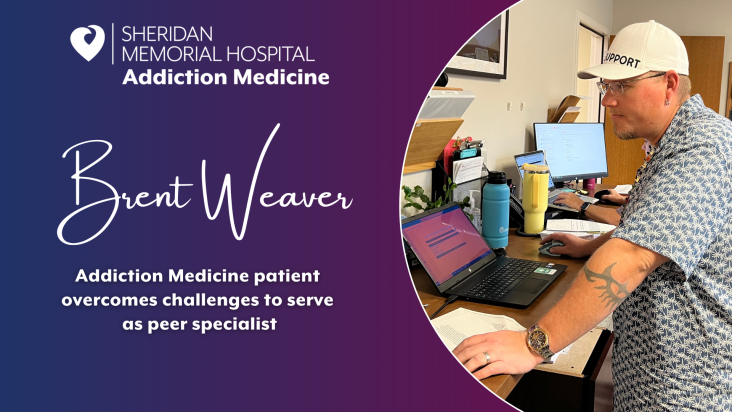Addiction Medicine patient overcomes challenges to serve as peer specialist
Brent Weaver always wanted to experience things. After leaving a private parochial school and entering public school, he had a tendency to rebel and experiment with limits – both his own and testing the limits of authority figures around him.
“This set me up to make a lot of bad decisions,” Weaver said. “I made them, I made those choices, but those really started me down a specific path.”
Weaver said he began gravitating toward the people who accepted him, including a group of individuals who partied and used controlled substances. He stopped prioritizing extracurricular activities like sports and agricultural organizations and started using alcohol and marijuana around the age of 15. Through high school, he experimented with hallucinogens, various street drugs and pharmaceuticals. By his early 20s, Weaver had become dependent on prescription pain medications, both due to his addictive thinking and a serious back injury that resulted in prescriptions for pain medications. Weaver said it was at that time he crossed the line in how he abused substances.
“In my own mind, when I started doing that, I saw myself as a junkie,” Weaver said. “I had always looked at people who did that as powerless, helpless.”
Weaver added that his opinion of himself shattered shortly after that.
“I wasn’t functioning as a person anymore,” he said. “Looking back at how fast it all happened, it hurts. I lost a lot of people. People were going to prison, overdosing or just disappearing. Interpersonal connections were fading away. I wasn’t spending holidays with my family. It was a dark, dark place for me.”
Weaver said he would have thought rock bottom was the day he had to serve time for a possession charge and found a good friend dead of an overdose, but it was actually six months later. He had what he described as a lightbulb moment – when he realized his life was not going to change only with his best intentions or will power. He needed help.
“I knew if I didn’t take some drastic action and get out of my existing situation, nothing was going to change,” Weaver said. “I knew it as clear as anything in my life – that the path I was on was destructive and I was going to either be dead soon or on a bus to prison.”
Weaver had heard about a local rehabilitation program and relocated to Sheridan to seek treatment. He went through about three months of inpatient treatment followed by three months in transitional housing focused on recovery. From ages 25-28, Weaver made it about 11 months at a time without using controlled substances, but found himself relapsing. He later found a medication assisted treatment program, but when that healthcare provider closed his office, Weaver again found himself struggling.
About 10 years ago, though, Weaver began working with Dr. Jason Ackerman in the Sheridan Memorial Hospital Internal Medicine and Addiction Medicine Clinic. Weaver said the clinic is different from others with which he had worked. It treats patients with compassion and empathy while providing structure and accountability. It also offers support for patients who have a setback rather than being punitive, Weaver said. The MAT program through SMH has helped Weaver remain sober and he began working to help others suffering with addiction or at-risk for substance abuse.
He earned a job at a court-ordered youth school where he discovered the key to his sobriety – paying it forward and helping others.
“I have to be active in my recovery,” Weaver said. “I have to be actively helping people find what works for them and advocating for others to find recovery.”
When a peer specialist he had leaned on asked if he’d ever considered taking on a similar role, Weaver jumped at the chance and earned the credentialing needed to work in the facilities he had first come to as a patient. He has worked as a certified peer specialist since 2021 and prior to that, beginning in 2014, he worked with at-risk youth doing similar work, helping others with empathy and understanding.
“When you first come into recovery, you’re a shattered person, he said. “There is so much guilt and shame that you carry into the doors when you first want help. If you’re sitting across from someone who has been in a similar position, who isn’t judging you, who understands, you have more belief in yourself that you can make a change. You don’t feel alone.”
Weaver now spends two days per week in the SMH Internal and Addiction Medicine Clinic, working with others receiving treatment for addiction. The clinic on average sees 292 patients per month, and peer specialists work with nearly all of them. While healthcare providers may have difficulty building relationships with patients undergoing treatment for addiction, peer specialists have the ability to create an empathetic bond through personal experience and knowledge of addiction and recovery.
The team in the SMH Internal and Addiction Medicine Clinic have noted that patients who connect with peer specialists are more likely to stick with their treatment, have fewer or less intense relapses and follow through with their recovery process.
While Weaver has lived experiences that some would struggle to understand, his journey now provides hope and encouragement for those who continue to struggle with addiction.
To learn more about the Sheridan Memorial Hospital Internal and Addiction Medicine Clinic, see https://www.sheridanhospital.org/medical-services/clinics/addiction-medicine/

